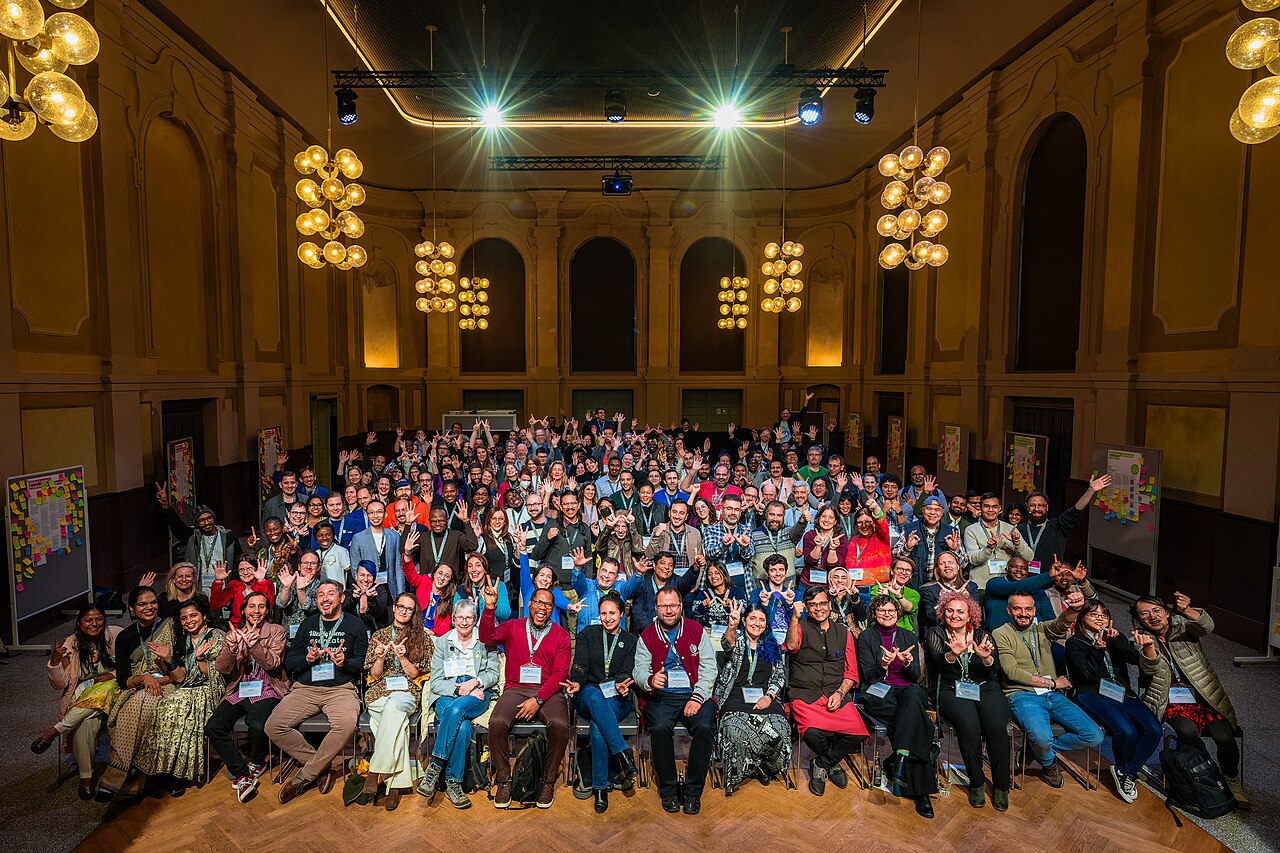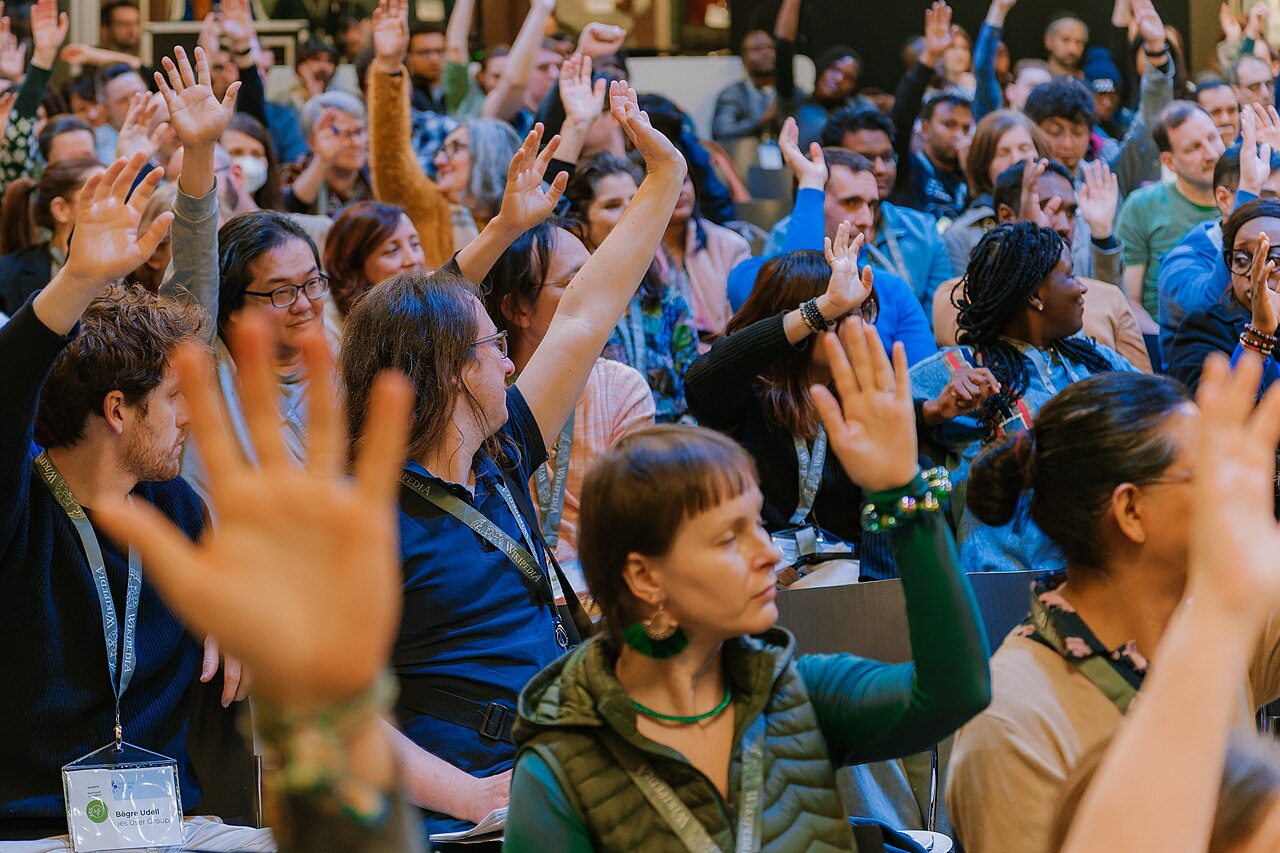05/09/2024
Reflections on Facilitating the Wikimedia Summit ‘24
This is how we worked with the Wikimedia movement to create the Wikimedia Summit ‘24 – an international three-day event in Berlin with over 170 Wikimedians.
They came together from all over the world to bring their movement closer to its strategic goal of transforming the governance structure so that decisions may be made more equitably. A big, exciting project that demanded our full attention and took us – as a newly formed collective – on quite a journey.

This post touches on our approach on facilitation; for background check out our facilitation page. For more on how to design and facilitate large group decision making, check out our brand new Playbook on Collective Deliberation. We’re always looking for new challenges, contact us!
Exploring the Wikiverse
When we got the go-ahead email for this gig we were in the middle of a 3-day training with organisations from the UK’s climate education movement. I remember doing a little happy dance with Wolfgang and Linda, just out of sight of the course participants. We were intensely excited and honoured. Not only because this meant that we could show our proclivities in designing and facilitating a large, complex deliberative process. But also because of who the Wikimedia movement is…
Wikimedia is on a mission to provide free, trustworthy knowledge in an age of increasing disinformation and monetisation of knowledge. Wikipedia (one of the projects of Wikimedia, along with WikiCommons, WikiData and others) is not only the largest encyclopaedia in the world, it is free for anyone with an internet connection and the content is written and edited by hundreds of thousands of volunteers. The ethos is: anyone who needs information should be able to access it freely and anyone who has the ability and willingness can become part of creating that knowledge. Wikipedia relies on donations and has paid staff to support the volunteers in their endeavour to create free knowledge. It is a beacon of light in a world full of misinformation and distraction (e.g. fake AI generated content and polarising algorithms) and restricted access to information (by state or market actors in the form of internet restrictions, paywalls, patents, NDAs, lack of transparency, etc).
Throughout the next months we worked with Wikimedia to develop an early draft for the creative process at the Summit. More specifically, we were working with Wikimedia Germany, one of the bigger organisations within the Wikimedia movement, and the one who’d taken on organising these international summits. They provided the logistics and the organisational backbone, and we led on designing and facilitating a process that supported the attendees to explore and articulate a collective position on the proposed Movement Governance Charter.
Starting out, one of our key tasks was understanding the Wikimedia movement’s structure and culture, how it operates and which processes, language, rules and habits it uses to reproduce itself. We read a lot on Wikimedia Meta (a wiki for matters internal to the movement) and listened to the WikiMove podcast, but even so, with a movement so big and diverse that has been around for more than two decades, it was definitely a steep learning curve to try to immerse ourselves in the worlds of Wikimedians.
One of the reasons we were brought into the project is our experience with working in and with social movements. At the start of the journey I thought the Wikimedia movement would be quite different from the groups working for social or climate justice. But the more I crossed paths with Wikimedians and got into deeper conversations, the more I realised that they faced a lot of similar challenges. Yes, the practices and tactics are very different, but they are alike in many other ways, for instance in the dedication to a collective vision and the willingness to go the extra mile to make something just a little bit better. This experience has broadened our understanding of the diversity of movements and what it means to be in a movement.
Building the Team
After a couple of months of working online we finally got to meet Nicole, Eva, Nikki and Laura, Wikimedia Germany’s Summit team, in person. Before that we had done our best to create trust and connection online by dedicating time in online meetings to ‘checking in’ with each other, rather than jumping straight into the things that needed doing. This enabled us to get to know each other better by learning what’s going on in each other’s lives. However, nothing beats face to face contact! Having the in-person meeting months before the Summit facilitated building a strong basis of trust which is essential to run a complex event like this.
One thing we reflected on afterwards was how important it was that we (Linda, Wolfgang and Lucas) had already established a close connection between us that enabled clear, direct communication, along with an aligned approach to facilitation. The Wikimedia Germany team also had close internal relationships and a lot of trust, and they were clear about the purpose of this Summit. We felt that the trust and quality of relationships we built within the core organising team emanated out into the other teams we worked with to create the event, which in turn rippled out into the atmosphere of the Summit itself.
One such team were the ten professional facilitators we worked with for the facilitation of the break-out rooms. While bringing them in we needed to be consistent in answering questions and inspire confidence in the process and our collective ability to deal with issues as they arose. We briefed them online two weeks before the Summit and created a handbook with everything they needed to know about their role, the purpose of the Summit, the different groups attending the Summit, etc. This all paid off – the facilitators felt well-supported throughout the process, they told us, which enabled them to take responsibility in and for their break-out groups.
At The Summit
It was amazing to meet Wikimedians from all over the world – delegations from Africa, Asia, Europe, Latin America and North America. All with their own stories of how they got involved and all caring so much about open knowledge – for some coming to the Summit meant travelling multiple days. Many had met online, but rarely saw each other in person, and some met at the Summit for the first time. As the participants poured in on the first morning, the energy in the venue was electric! There was also a feeling of anticipation, because the Summit had a crucial topic: to review a proposal for a new governance structure of the Wikimedia movement. Inevitably, this was fertile ground for high hopes, fears and tensions.
With all the people there, and our months of work coming to a crescendo, we acutely felt a sense of responsibility to show up fully and get the most out of this Summit. We wanted to support these amazing, dedicated people to deliberate on how to move towards a more equitable global governance structure to the best of our abilities. And of course we were excited to field test the deliberative process that we had designed, assembling group discussions, proposal making, feedback rounds and decision making sessions into a three-day programme. We had done all the prep we could; now was the moment to put it to the test! (If you want to learn more about the process, read our Playbook on Collective Deliberation!)
There were a few crucial moments in the process where our anticipation was particularly high: Would people leave usable feedback on the proposed Charter? Would the break-out groups come back from their sessions with coherent proposals? Would we be able pull together all the proposals into a set of items to vote on? And finally, would the participants be able to find a collective position, a voice?

Every single time, we got rewarded – thanks to our facilitation team, the collaboration with Wikimedians on the ground, lots of behind-the-scenes work and continuous small adaptations, the participants reached all the milestones of the process. And every night we returned to our modernised East German hotel tired but satisfied with a strong sense of ‘things are going really well!’ along with a healthy dose of ‘let’s not get complacent!’
One key challenge was getting 170 people to move between rooms fast enough to stick to the schedule. People love chatting outside of structured sessions (even when you plan in unstructured time), so it’s hard to get them back from the breaks. From attending 10 years of Wikimedia Summits, Nicole from Wikimedia Germany had an ingenious method to get people back into the sessions: karaoke! In the last few minutes of the break Nicole would wheel out a portable amp speaker on a dinner trolley cart and start to sing at the participants until they went to the session. (However, some participants started to sing with her so it wasn’t a fool proof plan.)
The Aftermath
It’s hard to explain exactly how it felt to run the three days of the Summit. In a way it was like a dream, which is maybe an experience that people share who have organised large, multi-day events like a festival, or a big direct action protest. Time feels totally stretched out because so much happens and you need to stay focussed, but at the same time, the event is over before you know it.
The day after the Summit, we met with the Wikimedia Germany team and spent the day debriefing with the Wikimedia team. It was incredibly powerful to discuss the whole process very openly and in detail; to express our heartfelt gratitude for one another; and do a celebratory dance 🦄. The general consensus was that the Summit was a huge success, and this was affirmed by the feedback we got from the participants’ survey.
To celebrate our validated belief in what can be achieved with deliberation, collective decision making and a good ol’ well-facilitated process (if we may say so ourselves), we rounded it off with a few tasty German wheat beers. Although Linda insisted on trying to find an ale in a traditional Berlin bar… 🙄
Planning a big event like this? Or have a smaller facilitation need? Send us a message to explore if we’re a good match, and check our facilitation page for more on how we work.
